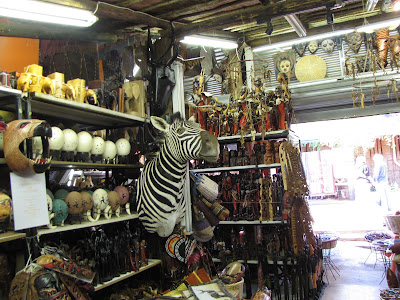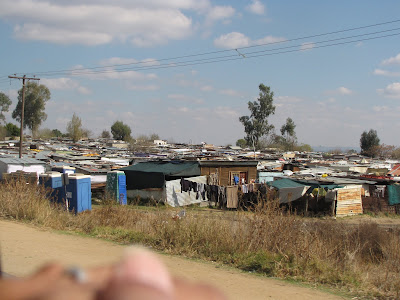Well today was low key, but fun. Our planned trip to the Apartheid museum was postponed, so we went for a nice drive through the countryside to a place called Chameleon Village. There is an African market there. Its basically a flea market where you can find all sorts of things that tourists buy to commemorate their trips to Africa.
Monique and I bargained a man down from 1200 rand to 400 rand, but we backed out at the last minute, and purchased a few things from another vendor. So far I have added 3 lions to my collection on this trip without spending much money. The wife tells me that I don’t need any more lions on this trip even though she practically forced the 3rd one on me. Don’t get me wrong, I REALLY liked it, but she loved it. I want to say she bought it for me, but I think that’s coming out of the house pot. Eventually we got back on the road and headed to Johannesburg to check into the Hilton. Since we were only a 10 minute walk from Mandela Square, I suggested we head over there. Our trip leader suggested that we go there in a group so we aren’t vulnerable as tourists. Well, you know my Jersey City bravado kicked in and I assured Monique that the 2 of us would be fine together. She still refused to walk though. So we took a cab over, walked around the mall, saw the 40 ft statue of Mandela, had a decent Thai dinner, and headed back to the hotel.
A Little Critical Reflection
As we drove from Chameleon Village to Johannesburg, we passed a place that the locals call “Mini Capetown.” It’s a beautiful mountainous range located right on the water. The hillsides are dotted with beautiful homes, and luxury cars frequently sped buy our 16 seat bus.
Our driver informed us that mostly Afrikaans (white South Africans) live in that area. So, I looked at my wife and said, I wonder when we will see an “informal settlement.” People who don’t know any better refer to the informal settlements as squatter camps, but they are not squatter camps. They are literally villages that spring up when poverty pushes large groups of people into a small area where no affordable housing is available. I explained to my wife that anytime you have a population of people this wealthy, you have to have a population of poor people to fill the service jobs that serve the needs of those wealthy people. They need maids and landscapers, opares and porters, drivers, etc. Sure enough, a few miles after we drove pass the homes of the wealthy, we came upon an informal settlement that covered an entire hillside. I’m talking a few miles on each side of the road of shacks built out of sheet metal, wood scraps, and tarps.
In case you are wondering why I expected to see this, I did a mini study on the history of Asbury Park, NJ several years ago. This is a little of what I discovered:
Asbury Park is a small city on the east coast of central New Jersey. The geographic dimensions of this city are about one and a quarter square mile. Asbury Park was actually named after Bishop Francis Asbury, the founder of Methodism in America. The city’s founder, James A. Bradley “wanted a special character for Asbury Park and donated land to religious and civic groups, offering only large residential lots to them. Most of the churches front 100-foot-wide Grand Avenue and are surrounded by large Victorian-style homes.” A major change occurred in Asbury Park “in 1906, when Asbury Park doubled its size by annexing the area west of the railroad, then known as West Park and part of Neptune Township.” It was a thriving resort town that needed a work force to sustain its tourist industry. “The area west of the railroad began to be settled as early as the 1880s by people needed as support staff for the many large hotels, and numerous services provided for the tourist trade.” This gives true meaning to the phraseology of coming from “the other side of the tracks.”
I found that this phenomenon is commonplace. So when I saw that settlement I wasn’t surprised. There are bottoms, lowlands, skids rows, slums, ghettos, "other side of the tracks," and informal settlements existing in the shadow of prosperity all over the world. These issues are not unique to South Africa. They are global issues. The question is, how do we go about addressing these issues? If your answer is meritocracy, I’m gonna have to ask you to do some homework before you offer me that one.
1 http://asburypark.net/info/history.html
2 Ibid
Written by Frederick A Hanna






No comments:
Post a Comment